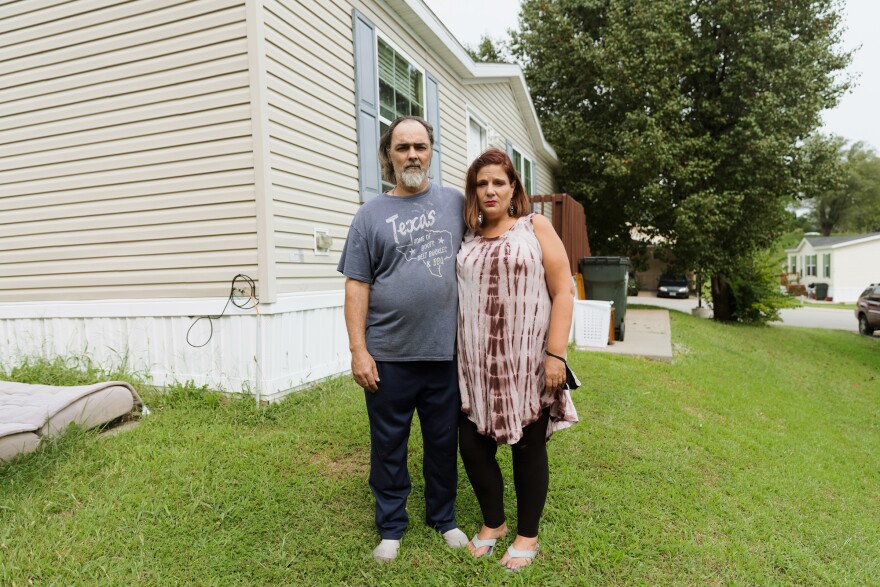In late August, 66-year-old Jacqueline Young filled out the eviction declaration form from the Centers for Disease Control and Prevention — thinking it would protect her after briefly falling behind on rent. She’s lived in her trailer at a mobile home park in Independence, Missouri, for four years.
Days later, the U.S. Supreme Court rejected the Biden administration’s eviction moratorium.
And at the end of the week, Young received an eviction notice from her landlord.
“I was scared to death,” Young said. “I have never in my life been evicted — ever. So I was just absolutely petrified. And then I started worrying about, well, where would I go?”
It’s a question on the minds of many tenants across Kansas City. With the federal eviction moratorium gone, and no statewide moratorium in place in Missouri or Kansas, tenants who fell behind on rent during the pandemic are now at risk of losing their homes. It’s putting tenants like Young at the crux of intersecting crises — lack of affordable housing, evictions and a pandemic — without any protections in place.
“I think we’re just at a point in time where everything is kind of adding up,” said Rachel North, an attorney at Legal Aid of Western Missouri, a local organization that assists tenants with evictions. “It’s difficult to get rental assistance. Cases have still been filed. There’s been judgments entered even during the course of the eviction moratorium. And we’re just at a point where people are running out of time.”
Attorneys expect eviction filings to ramp up
According to the National Equity Atlas, 94,000 households in Missouri were behind on rent as of early August. They’re more at risk now of losing their homes without any moratorium in place.
Gina Chiala, lead attorney and executive director at the Heartland Center for Jobs and Freedom, a local nonprofit that offers legal help for tenants, is expecting a “wave of evictions.”
“We’re expecting cases to be quadrupled,” Chiala said. “We’re not ready. Our leaders haven’t done what’s necessary to prepare for it. The money is there to prevent it, but the mechanisms to use that money to stop evictions is not there.”
The Kansas City Beacon requested data from the 16th Circuit Court of Jackson County and found that 1,858 evictions for nonpayment of rent were filed from the beginning of 2021 to the end of July. In June, 384 eviction cases were filed for nonpayment of rent — the highest number of evictions filed in a given month during the pandemic since March 2020.
In 2019, more than 9,000 total eviction cases were filed in Jackson County court. This includes those filed for rent and possession, landlord complaint and unlawful detainer. Last year, 5,590 total cases were filed, a 38% decrease. The total number of eviction cases filed in 2021 through the end of July is 2,810, slightly behind last year’s pace.
In May, a U.S. district court struck down the CDC’s eviction moratorium that was established in September 2020 and set to expire July 31. The Supreme Court ruled in late June that the CDC did not have the authority to implement a federal eviction moratorium but allowed it to remain in place until July 31.
The Biden administration issued a new moratorium Aug. 3. It was set to expire Oct. 3 until the Supreme Court intervened again, arguing that only Congress has the power to enact another moratorium.
Stacey Johnson-Cosby, a landlord in Kansas City and president of the Kansas City Regional Housing Alliance, said the Supreme Court’s ruling was expected and hopes the decision prompts local governments to get rental assistance out faster.
“I think when it was in place, it gave them time to say, ‘Oh, there’s something protecting tenants, we don’t need to rush,’” Johnson-Cosby said. “I think now that it’s gone, it’s going to force them to do what they should have done in the beginning, which is to make it easier to learn about the rental assistance, first of all, and secondly, to streamline the process.”
In the meantime, residents like Young have turned to housing justice group KC Tenants for help. Mason Andrew Kilpatrick, a leader with KC Tenants, is seeing firsthand the ripple effects of the Supreme Court’s decision on local residents. Kilpatrick said calls to the KC Tenants hotline doubled in the weeks since the court’s ruling. The No. 1 concern from tenants? Evictions.
“There are many people who thought that they had at least another month to at least kind of save money, wait it out, have time to look,” Kilpatrick said. “So what could have at least been another 30 days for people to figure things out has now turned into 24 to 48 hours.”

Without protections, Kansas City tenants face uncertain future
As a U.S. Army veteran living on a limited income from pension payments and Social Security, Young said she has to pick and choose what bills to pay each month. She works part-time as a truck driver to supplement her income, though the work — and pay — is inconsistent.
Young knows it will be difficult to find an affordable place to live if she ends up with an eviction. Since receiving the notice, she’s felt anxious and panicked.
“I won’t be able to sleep because I’m worried about, … ‘Are they going to come and take everything out of my house and lock me out?’” Young said.
A few miles west, Kansas City resident Jennifer Mosby has similar worries. On Sept. 2, Mosby was one of dozens on the afternoon docket for eviction proceedings at the Jackson County Courthouse.
Mosby received an eviction notice in July. It came as she got sick from COVID-19 and couldn’t work for weeks. When she recovered, Mosby was let go from her job. Her electricity has been off for two months.
“I have nowhere to go,” Mosby said. “So if I get kicked out, I’m homeless.”
In northern Kansas City, Angela Alvelo and her family have done all they can to pay their rent during this pandemic and avoid homelessness. They’ve exhausted their 401(k), spent their savings and sold their car.
“The duress is real,” Alvelo said. “We don’t have a safety net anymore. We don’t have what we had prior to the pandemic.”
There were months when they paid rent a few weeks after the due date. There’s unpaid bills piling up, hurting their credit score.
In late June, Alvelo received an eviction notice. Alvelo thought her family had until October but was supposed to vacate by the end of August. Still looking for a new home, Alvelo is now waiting for the police to vacate her family.
“Now we don’t have any time to get on our feet,” Alvelo said. “We got to get right out the door. What are we supposed to do?”

Moratorium did not stop evictions from being filed
The federal eviction moratorium did not prevent landlords from filing evictions in Kansas City, though the number of evictions filed was fewer than prepandemic. Still, there were tenants who received an eviction on their record during the pandemic.
The Jackson County court provided data to The Kansas City Beacon on the number of writs for evictions issued. If a judgment on an eviction case is issued, a writ is issued for the eviction to be carried out. From last September to July, when the federal eviction moratorium was in place, 1,419 writs for evictions were issued. During that time, 585 evictions were actually executed and carried out.
In the months that the CDC’s eviction moratorium was in place, more than 3,000 eviction cases were filed for nonpayment of rent — the kind of eviction the moratorium was supposed to prevent.
Advocates urging Congress, courts to take action
The ball is now in the hands of Congress to enact an eviction moratorium. In the days following the Supreme Court’s ruling, members and allies of KC Tenants called on Rep. Emanuel Cleaver, who represents Missouri’s 5th District that includes Kansas City, to support an extension of the moratorium via legislation.
If a new moratorium is enacted, Chiala with the Heartland Center said it should not have the same loopholes as the CDC eviction moratorium.
“That would be an eviction moratorium that prevents landlords from evicting anybody during the time that the coronavirus numbers remain high,” she said. “That’s one thing that we need on a national level, we need Congress to pass that now.”
States and local courts can enact their own moratoriums on evictions. A statewide eviction moratorium in California was extended to Sept. 30. Legislators in New York state extended an eviction moratorium until January. Missouri had no such policy for renters at any time during the pandemic. Kansas Gov. Laura Kelly instituted a policy preventing landlords from evicting tenants who fell behind on rent because of a COVID-19 hardship that was revoked in May 2021 by Kansas lawmakers.
Chiala said local courts should enact diversion programs to prevent evictions. This could include the court requiring landlords to apply for rental assistance on behalf of a tenant before filing an eviction, like what currently exists in Philadelphia.
“The court has the power to help create a program that ensures that those resources are getting into the hands that need them, and that those resources are used as they’re intended to be to stave off this eviction wave,” Chiala said.
This story was originally published on the Kansas City Beacon.






